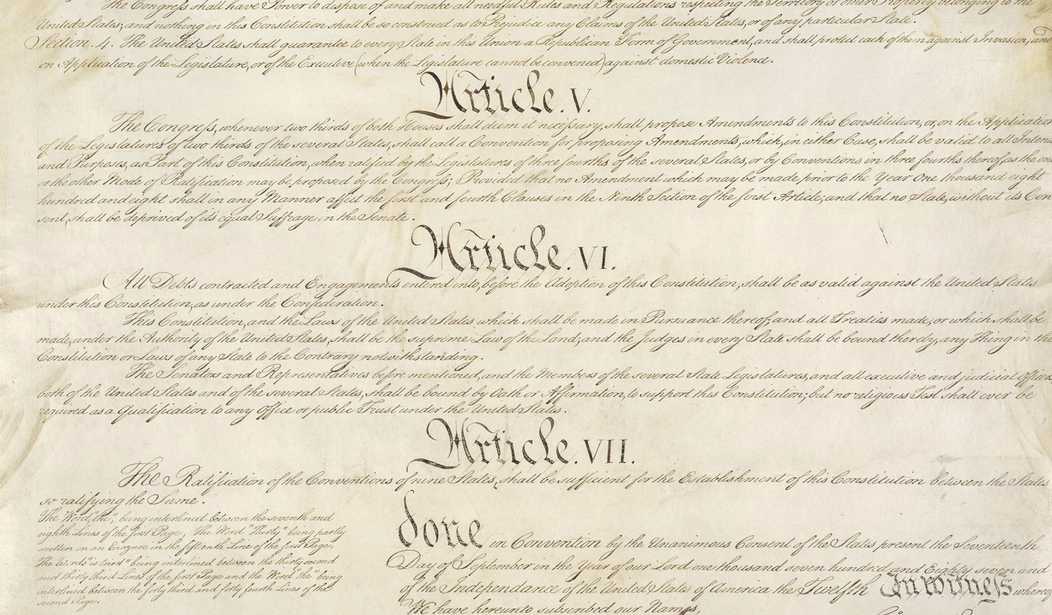The National Archives has come under considerable criticism in conservative circles for posting a trigger warning on its collection of primary source material reflecting our national history. This includes the collection known as the Charters of Freedom — the Declaration of Independence, the Constitution, and the Bill of Rights.
Such discussions have created the clear impression that these three documents are considered offensive and racist by the National Archives. The natural inference from such a conclusion is that our founding documents should be denounced, discarded, and replaced.
While there are many troubling aspects arising from the National Archives report on systemic racism, it stops short of a total repudiation of our founding documents. Further, its conclusion suggests that a path could be found that would pay proper respect to both sides of the current debate about our founding.
I suggest an approach that could properly honor our founding documents and the people who drafted them, while also telling the very real story of the long struggle our nation continues to endure to produce legal equality for all of our people.
The starting point would be to get our history correct.
America was not founded in 1619 when enslaved Africans were brought to our territory. Nor was it founded at Plymouth Rock or Jamestown. Until July 2, 1776 (yes, that’s the day we actually declared our independence) we were British colonies.
On July 4, 1776, we took the further step of chartering a new nation with the document that we call the Declaration of Independence. Its actual title is the Unanimous Declaration of the Thirteen United States of America. We did more than say goodbye to England. We committed ourselves to becoming a united nation—not merely a collection of independent former colonies.
The ideals of the Declaration cannot be assailed—despite the critical information quoted in the report from National Archives. All are created equal. All are endowed by God with inalienable rights. We should be governed by the consent of the governed.
Recommended
The central theme of the critics is that America did not live up to its self-proclaimed principles on the first day of our national existence.
The idea that such perfection could be possible on the first day we began the process of throwing off a tyrannical overlord is unreasonable. The ideals of the Declaration were not intended as a descriptor of the current reality in place at that moment. Rather, it was a statement of our vision and mission as a nation. It was the roadmap describing our ultimate destiny.
While the focus has been on the lack of full equality in 1776, even a quick review of the facts establishes that none of the three central promises of the Declaration were in place at that time.
Our God-given rights were not guaranteed. We were not being governed by our consent. And, yes, equality was not in law or practice for women or people of color.
It took time to establish all three of these ideals. Self-government was improved dramatically when the Constitution was drafted in 1787 and subsequently ratified. Protection of our God-given rights took a great step forward with the adoption of the Bill of Rights in 1791. And with the adoption of the 13th, 14th, 15th, and 19th amendments, institutionalized inequality was rendered unconstitutional in our land. Change takes time, but the constitutional framework was set aright with those amendments.
Every step along the way, including milestones like the Civil Rights Act of 1964, was achieved not by denouncing our founding—but by calling us to live up to its promises.
Frederick Douglas, in his seminal speech “What is the Fourth of July to the Slave?” got it right. He declared that slavery and racism were contrary to the Declaration, contrary to the Constitution, and contrary to the Bible. His call: Live up to the ideals of the American founding.
If the National Archives intends to denounce our founding—as much of the report seems to indicate—there will be even further divisiveness. But if our Archivist wants to tell the truth about history (both good and bad) and celebrate the great ideals of our nation as we continue to march toward their fulfillment, many conservatives stand ready to help in such an effort.
Count me in, if that is the approach. We need a path to become a truly united nation.
Michael P. Farris is president and CEO of Alliance Defending Freedom (@AllianceDefends).

























Join the conversation as a VIP Member